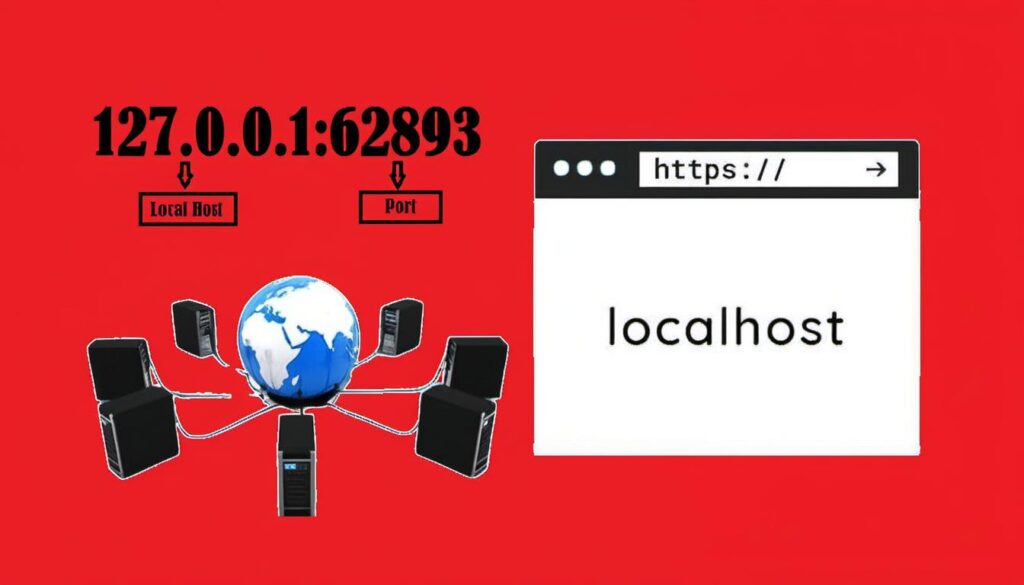
Introduction
127.0.0.1 is commonly referred to as the “localhost” in networking terminology. It serves as a loopback address used for testing and communicating within the same machine without requiring external network access. When a device sends a request to 127.0.0.1, the request is directed back to itself. This mechanism is widely used for development, troubleshooting, and testing software applications in a secure, isolated environment. The combination of 127.0.0.1 with a port number, such as 62893, is often seen in web development, where developers run local servers or services on specific ports to test their applications before deploying them to production.
The Role of Port Numbers in Networking
Port numbers, like 62893, are vital for facilitating communication between applications and services on a network. Each port acts as a communication endpoint, allowing multiple processes to run simultaneously on the same machine without conflicts. In the case of 127.0.0.1:62893, the IP address 127.0.0.1 designates the localhost, while the port number 62893 specifies a unique entry point for a particular application or service. By combining an IP address and a port number, the system ensures that data packets are directed to the correct destination.
Why Use 127.0.0.1:62893 in Development?
For developers, localhost addresses like 127.0.0.1:62893 provide a safe and controlled environment to build and test applications. Here are some reasons why this setup is indispensable:
- Isolation: Testing on localhost prevents interference from external network traffic, ensuring a stable and predictable environment.
- Security: Since 127.0.0.1 is restricted to the local machine, it minimizes the risk of unauthorized access during development.
- Convenience: Developers can quickly launch and debug applications without needing to configure external servers.
- Cost-Effective: Running services locally eliminates the need for expensive hosting solutions during the early stages of development.
The Function of Port 62893
 Port numbers above 1024, like 62893, are typically considered “dynamic” or “ephemeral” ports. They are often assigned by the operating system for temporary communication sessions or for specific applications requiring unique ports. When a developer sees 127.0.0.1:62893, it likely indicates that a local server, such as a web server or database service, is running on that specific port. This could be part of a framework like Flask, Django, or Node.js, which assigns ports dynamically when launching a development server.
Port numbers above 1024, like 62893, are typically considered “dynamic” or “ephemeral” ports. They are often assigned by the operating system for temporary communication sessions or for specific applications requiring unique ports. When a developer sees 127.0.0.1:62893, it likely indicates that a local server, such as a web server or database service, is running on that specific port. This could be part of a framework like Flask, Django, or Node.js, which assigns ports dynamically when launching a development server.
Troubleshooting Issues with 127.0.0.1:62893
While localhost and port configurations are generally straightforward, issues can arise. Here are some common problems and their solutions:
- Port Conflicts: If another application is already using port 62893, the server may fail to start. Check for running processes using the port and terminate them if necessary.
- Firewall Restrictions: Ensure that your firewall settings allow localhost communication on the specified port.
- Misconfigured Software: Verify that the application using 127.0.0.1:62893 is properly configured and that all dependencies are installed.
- Network Issues: Although localhost does not rely on external networks, internal networking issues, such as incorrect loopback configurations, can cause problems.
Practical Applications of 127.0.0.1:62893
Using localhost and ports is not limited to software development. Here are some practical scenarios where 127.0.0.1:62893 might be utilized:
- Web Development: Developers use local servers to preview and debug web applications before deploying them online.
- Database Management: Localhost ports facilitate secure communication with databases like MySQL, PostgreSQL, or MongoDB during development.
- API Testing: Developers use localhost to test APIs with tools like Postman or cURL.
- Custom Tools: Engineers often create bespoke tools that run locally, such as monitoring dashboards or automation scripts.
Security Considerations for Localhost Ports
Although localhost communication is inherently secure, developers should still take precautions:
- Access Controls: Ensure that applications using localhost ports are not accidentally exposed to external networks.
- Strong Authentication: If the application requires login credentials, use secure methods such as OAuth or hashed passwords.
- Data Encryption: Protect sensitive data transmitted between services, even on localhost, by using encryption protocols like HTTPS.
- Regular Updates: Keep software dependencies up to date to avoid vulnerabilities that could be exploited locally.
Advanced Uses of Localhost and Ports
Beyond standard development practices, localhost addresses like 127.0.0.1:62893 can be leveraged for advanced use cases:
- Proxy Servers: Local proxies route traffic through localhost to filter or analyze network data.
- Containerized Development: Tools like Docker often use localhost ports for container communication.
- Machine Learning Models: Local servers can host AI models, allowing developers to interact with them in real-time during training or inference.
- IoT Testing: Localhost setups simulate IoT devices communicating through designated ports, enabling testing without physical hardware.
Optimizing Performance on Localhost
To ensure optimal performance when using 127.0.0.1:62893, consider the following tips:
- Resource Allocation: Assign sufficient system resources to the application running on the localhost to prevent slowdowns.
- Efficient Code: Optimize your application code to reduce latency and improve responsiveness.
- Monitor Usage: Use monitoring tools to track port activity and identify potential bottlenecks.
- Cleanup: Regularly terminate unused processes to free up ports and system resources.
The Relationship Between Localhost and Virtualization
Virtualization technologies have transformed the way localhost environments are utilized. Platforms like VirtualBox and VMware allow developers to create isolated virtual environments that communicate via localhost. In these scenarios, addresses like 127.0.0.1:62893 serve as gateways for seamless interaction between virtual machines and the host system. This approach is particularly beneficial for testing applications across multiple operating systems or configurations without requiring additional hardware.
The Future of Localhost in Development
As technology evolves, localhost addresses like 127.0.0.1:62893 remain indispensable for developers. The rise of cloud computing, microservices, and edge computing has increased the demand for robust local testing environments. Additionally, innovations in virtualization and containerization have made localhost setups more versatile and scalable. These advancements ensure that localhost will continue to be a cornerstone of software development for years to come.
Conclusion
127.0.0.1:62893 is more than just a technical notation; it represents the backbone of local development and testing. By providing a secure, isolated environment, localhost addresses enable developers to innovate with confidence. Whether you’re building a web application, testing APIs, or exploring new technologies, understanding localhost and ports like 62893 is essential. With proper configuration and best practices, you can harness the full potential of this powerful tool, driving your projects toward success.
You May Also Read: It Is Not Wisdom but Authority That Makes a Law – T. Tymoff


